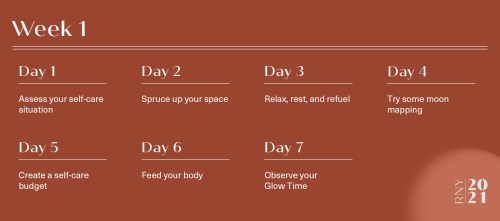7 Daily Actions for Cultivating a Self-Care Practice That Nourishes Your Mind, Body, and Soul
Wellness maven Latham Thomas shares daily actions for building a self-care practice that best suits your needs—and nourishes your mind, body, and soul.

Happy New Year! Welcome to a moment customized for you.
For the next four weeks, I’ll guide you through a program designed to nourish you along your self-care journey. We’ll focus on identifying what you need more of (and less of) to make sure your needs are met. We’ll touch on everything from feelings to food, from rest to movement—and by the time February rolls around, you’ll have developed the tools and habits you need to take care of yourself every day.
Each day, you’ll have an activity designed around self care. Some of these activities may take only a few minutes, while you may want to take more time with others—but all of them will help you build self care into your everyday life.
This is not a program about bubble-bathing away your problems or starring in an externalized Instagram challenge. This is about supporting you—and I’ll be here to virtually hold your hand on this four-week path to self-nurturing. Together, we will design a life you don’t need to escape.
This first week is all about laying a solid foundation upon which you can build your self-care practice. Let’s get into it.

Day 1: Assess your self-care situation
Congratulations! You’re taking the first step toward giving yourself more of what you need. To prepare for a prosperous journey, gather a few items that will become part of your self-care toolkit. What do you need to succeed? I recommend a journal or notebook, choosing a candle for mood lighting (flameless is fine), and creating a self-care corner—even if your designated space is literally the size of a cushion. None of this has to be expensive (in fact, you probably have enough around your home already to get started) but it will help set you up for success.
Once you’ve identified your care supplies and designated self-care space, spend 20 minutes with your journal and a pen.
Here are some prompts to get your juices flowing:
- What do I need support with?
- What support am I already good at giving myself?
- What experiences do I want to invite more of?
- In what ways am I giving to others that I am not giving unto myself?
- Where do I rank on my own priority list?
There are no right or wrong answers, just true ones, so write honestly and freely.
Day 2: Spruce up your space
Especially during this pandemic, when so many of us are staying at home, it’s important to create an environment that feels like a sanctuary. So today, give some attention to your personal space. Make your bed, open the curtains and windows to invite in light and fresh air, and devote a few minutes to de-cluttering.
This doesn’t require a top-to-bottom, Marie Kondo-style revamp or deep clean. Instead, get rid of three things that are creating mental and emotional clutter in your life. Letting go creates more space in your home, in your head, and in your heart, too.
Day 3: Rest, relax, and reflect
One of the most important aspects of self care is often the first to be sacrificed. Yes, I’m talking about sleep—because when we feel tired and run-down, everything is harder. This month, I’m following Arianna Huffington’s sleep program because sleep really is a super power, and we can reclaim our rest when we make time and space for it. (Join us for our Zoom check-ins at 5 p.m. ET / 2 p.m. PT on January 7 and January 21!)
Today, carve out some time for an afternoon nap; think of it as a mid-day refresh to help improve your mood and cognitive functioning. I promise, it’s well worth the short time investment. And if you can’t fall asleep, don’t stress; simply lying down and resting can recharge your energy stores.
Pro Tip: Lying on your back and resting your legs up the wall at 45 degrees (leg drain) allows the blood to drain back up to your heart, helping to reset the body. Hanging here for 20 minutes is equivalent to taking a two-hour nap!
Also, consider making adjustments to your daily routine that may help you sleep more soundly overnight. Could you skip that afternoon coffee, for instance, or invest in a silk sleep mask, weighted blanket, or ear plugs to quiet your senses for deeper sleep? Rest hours allow your body to recover and your mind to dream. Treat them as though they’re sacred, because they are.
Day 4: Explore moon mapping
Want to use your energy wisely? Look to the night sky—more specifically, the moon and its phases. The new moon is an ideal time to plant the seed of an idea and embark on a new project. The full moon is associated with harvest, making it a good time to bring those projects and ideas to fruition. When you plan your activity around the lunar cycles, you seize an opportunity to attune your body to these natural rhythms. This is called moon mapping. (Learn more about it here!)
Moon mapping is simple. In your journal or calendar, note the dates of upcoming lunar changes (when the moon is waxing towards full or waning towards new) and plan activities around a goal, project, or idea that’s personally important. (The next new moon is January 13, and the next full moon is January 28.) Next week, you’ll be primed for productivity, so plan activities that require more of your energy. By the time the full moon arrives, you can rest while looking back on and appreciating your efforts.
Pro Tip: If you bleed, you can moon map your cycle monthly to orient your activities around rest, nourishment, and moving slowly.
Day 5: Create a self-care budget
Despite what some people may want you to believe, self care isn’t about spending. It’s a self-check-in on a moment-to-moment basis where we ask ourselves, “What is it that I need right now?” The response to that need is the care we give to ourselves. A walk through nature, a soak in the tub, a foot rub, checking out a library book, phoning a friend, making tea—all of those restore the spirit, and they don’t cost a dime.
Still, some other things that may be really helpful to us on our journeys do cost money, so I encourage you to make space in your budget for those aspects of your personal well-being. What do you require, weekly or monthly, to meet your self-care goals? For example, consider the cost of therapy, massage, art supplies, or even fresh produce. If you find that your needs are bigger than your budget allows, it’s time to get creative and reflective. Perhaps you could try sliding-scale group therapy instead of one-on-one, for instance. Maybe barter for services?
Budgeting isn’t the sexiest task, but the benefit of budgeting for self care—and by that, I mean including it as a line item just as you do your monthly housing payment or cell phone bill—is that you won’t have to feel like self care is an optional splurge, or that it’s financially out of reach. Making confident, informed decisions that honor your financial goals (without creating can-I-afford-this? money anxiety) is a powerful form of self care, too. Build out your self-care budget and remember, this is a real necessary part of your overall monthly expenses.
Day 6: Feed your body
Have you noticed how in the winter, our bodies crave substantial foods like roots, tubers, starches, beans, and legumes? These are all things that grow along the ground or underground, supporting us to get through dark, cold winter months. These fortifying foods help ground us and sustain us through the season.
I encourage you to expand a relationship with some of these nurturing, therapeutic foods that winter offers. Add a hearty winter vegetable like parsnips, beets, sweet potato, or kohlrabi to your grocery cart, or try a healthy recipe for a hearty, warming lentil stew. Grab some cookbooks you have or head to Google or your fave cooking blogs to gather some recipes to try out and perfect this winter! Give your body the foods it’s asking for—warming ones—and you’ll be rewarded with wonderful flavors and energy to sustain you.
Day 7: Observe your “glow time”
This is a time to unplug from work and routine, a time to disconnect with the outer world and slow your pace, to enjoy family and time alone. Take time to walk outside. Cook a slow meal and savor it with gratitude. Relax with a candlelit bath and a good book. Write poetry. Get a massage and don’t check your phone afterward; just be.
What are the many ways you can pour back into yourself? What’s your ritual for giving thanks? What helps to dial you back into what’s important and what’s holy? This Sabbath observance is at the essence of what I call glow time. It is all about honoring the Divine within and creating sacred portals of self-renewal.
Looking to hit refresh on your healthy habits this January? Check out our full 2021 ReNew Year program for expert-led plans for better sleep, nutrition, exercise, and self-care routines.
Sign Up for Our Daily Newsletter
Get all the latest in wellness, trends, food, fitness, beauty, and more delivered right to your inbox.
Got it, you've been added to our email list.








